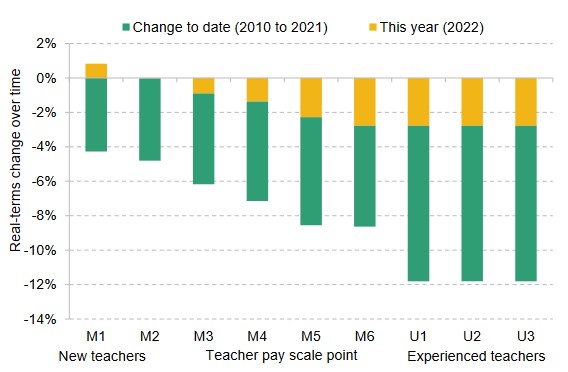The government will not meet its promise to restore school budgets to 2010 levels, when the Conservatives first gained power, a new study warns.
The Institute for Fiscal Studies says rising costs will leave schools worse off by the next election than 15 years previously, despite funding hikes.
Rishi Sunak, while chancellor, pledged to “restore per-pupil funding” to 2010 spending patterns in real terms by 2024-25.
But the study found budgets are actually on track to be worth three per cent less after inflation, which school leaders have dubbed “scandalous”.
The “very significant squeeze” makes it “that much harder” for schools to fulfil the government’s levelling-up agenda, the IFS warned.
Cash now, crunch later
The government has promised to hike core school funding from £49.8 billion last year to £56.8 billion in 2024-25.
However, despite the increase being front-loaded, rises in teacher pay and energy bills will only be“just about affordable” for schools in 2022-23.
Per-pupil funding rose by 7.7 per cent this year, but IFS economist Luke Sibieta expects school costs to eat up most gains (6 per cent).
And he added: “The problem comes in future years.”
Smaller funding boosts and continued school costs in future years suggest budgets will actually fall 1 per cent in real terms, which accounts for inflation.
By 2024-25, when the next general election is likely to be held, school funding is still likely to lag behind 2010 levels, meaning “real-terms cuts to school budgets on current trends and spending plans”.
“The resources and staff that schools can buy will be about 3% lower in 2024–25 than in 2009–10,” the report stated.
It compares to average real-terms growth of more than 3 per cent a year in school per-pupil spending under the New Labour government between 2003-04 and 2009-10.
Sibieta also stressed funding will be “very different” between different schools, with those employing more support staff and inexperienced teachers facing faster growth in wage costs this year.
A Schools Week investigation last week revealed widespread alarm over soaring costs. More than two in five leaders said they would have to consider job cuts without further government cash.
Even new teachers’ pay worth less
Last month, caretaker education secretary James Cleverly called experienced teachers’ 5 per cent pay award in September “the biggest pay rise in a generation”. He also highlighted flagship plans to raise starting salaries to £30,000, with an 8.9 per cent salary hike.
But IFS analysis suggests most teachers’ pay will still be 12 per cent lower in real terms this year than in 2010. Even teacher starting salaries are reported to be worth at least 3 per cent less after inflation, and early career teachers’ pay is down between 6 and 8 per cent.

The government’s U-turn on agreeing a two-year pay deal was “understandable”, but Sibieta says it makes financial planning more difficult for schools.
Meanwhile the IFS warned that proposals to offer many support staff a £1,925 pay rise will be “a significant pressure”, particularly for special schools with more such employees.
The IFS said energy and food prices also “weigh extremely heavily on school budgets” because they make up around a quarter of non-staff costs.
Some schools face ‘deficit budgets’

Julia Harnden, a funding specialist at the Association of School and College Leaders, said the 15-year spending squeeze was a “very poor reflection on the government’s priorities”.
She condemned the lack of extra funding for pay rises, and lack of response to ASCL’s “repeated warnings” over soaring energy costs. Some schools face “deficit budgets” and cutbacks, she warned, with sixth forms particularly struggling.
NAHT general secretary Paul Whiteman said it was “scandalous” the government could not even meet its “feeble” pledge to restore 2010 funding. He warned cuts threatened staffing levels and children would “ultimately suffer”.
Labour shadow schools minister Stephen Morgan said schools were now “doing more with less”, and promised to scrap private school tax breaks if elected.
“Conservative leadership contenders would rather bluster about the return of grammars than pledge any real action to secure children’s education.”
A DfE spokesperson said core school funding was rising by £4 billion this year, a 7 per cent rise. It makes any increased costs “broadly affordable for schools in 2022-23”.
“We recognise that schools – much like the wider economy – are facing increased costs due to the unprecedented recent rise inflation.”
They also said tools and information were available to help schools achieve value for money, and said schools in financial trouble should contact councils or the Education and Skills Funding Agency.
















Your thoughts